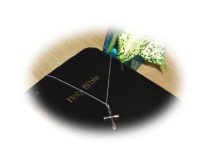From a sermon series on 1 Kings by See Huang Lim, a missionary at IBF.
Last month, we saw how God sent a drought to discipline the Israelites under King Ahab who turned away from the worship of God to the worship of Baal. Then, we witnessed the great contest between the 450 prophets of Baal against the prophet Elijah at Mt. Carmel. God demonstrated that He alone was God by bringing down fire from heaven, showing that Baal was a false god. This miraculous sign was meant to draw the Israelites back to God.
Today, we continue our story of Elijah, which deals with prayer.
[Read 1 Kings 18:41-46]
The topic of prayer can fill endless books, but let’s just think about four principles today:
1) praying with humility,
2) praying for God’s will,
3) the prayer of a righteous person,
4) praying out of gratitude.
Praying with humility
First, about humility: In verse 42, we see that Elijah “bowed down on the ground, and put his face between his knees” (NKJV).
It doesn’t say he prayed, but many scholars think he was praying because this is a posture of humility. Our posture before God when we pray reflects our humility before God. That’s why when we pray, we bow our heads as a sign of reverence and respect to God. Let’s not forget that we are not just praying with our words but also with the posture of our physical body and heart.
We may consider Elijah a super-prophet and forget that he is just human. But the miracles we saw in the previous chapters were all God’s power. Even after Elijah’s dramatic victory over the prophets of Baal, he remains humble before God.
Likewise, when we pray, we don’t go to God with a sense of entitlement as if God owes us anything. We are the servant; He is the Master.
Praying for God’s will
Second, as God’s servants we should pray for His will to be done. How did Elijah say so confidently to Ahab that heavy rain is coming? His confidence was based on his understanding of God’s law, as given through Moses to the nation of Israel.
The law recorded in Deuteronomy talks about God’s blessings for Israel’s obedience and God’s punishment for disobedience.
For example, Deut 11:16 says this: “Be careful, or you will be enticed to turn away and worship other gods and bow down to them” (which is what King Ahab did). Verse 17 continues, “Then the Lord’s anger will burn against you, and he will shut the heavens so that it will not rain and the ground will yield no produce.”
In contrast, Deut 28:12 mentions the blessing of rain for Israel’s obedience: “The Lord will open the heavens, the storehouse of his bounty, to send rain on your land in season and to bless all the work of your hands.”
So Elijah’s hopes were based on his knowledge of God’s ways. Likewise, let us learn more about God’s ways so we can pray according to it.
The Apostle John encourages Christians to pray for God’s will, in 1 John 5:14-15. He writes, “This is the confidence we have in approaching God: that if we ask anything according to his will, he hears us. And if we know that he hears us—whatever we ask—we know that we have what we asked of him.”
The prayer of a righteous person
This brings me to the third point: The prayer of a righteous person.
Let’s look at James 5:16-18: “Therefore, confess your sins to each other and pray for each other so that you may be healed. The prayer of a righteous man is powerful and effective. Elijah was a man just like us. He prayed earnestly that it would not rain, and it did not rain on the land for three and a half years. Again he prayed, and the heavens gave rain, and the earth produced its crops.”
What does the Bible mean when it says, “The prayer of a righteous man is powerful and effective”? Does it mean that only prophets like Elijah have powerful prayers? Well, verse 17 says, “Elijah was a man just like us.” I think James is encouraging his readers in two ways.
First, to pray. To not remain a mindset of “Oh, God won’t listen to me.” James says that if we have sinned and our relationship with God is not good, don’t stay like that; confess and pray!
Second, I think James is encouraging his readers to be righteous, like Elijah, who was “a man just like us.” As followers of Jesus, we know that becoming righteous is a gift that only God can give us through the sacrifice of Jesus and the work of the Spirit.
Praying out of gratitude
Lastly, praying out of gratitude. Do we talk to God only when we have a problem?
Perhaps you don’t have a problem right now. But maybe your life isn’t as exciting or joyful as you hope for. What does the Apostle Paul say about that? He teaches that being thankful should be a basic principle in daily life and church community life.
For example, in 1 Thessalonians 5:16-18, he says: “Be joyful always; pray continually; give thanks in all circumstances, for this is God’s will for you in Christ Jesus.” It’s not that you have to pretend to be happy. His point is: Make an effort to recognize the good things that are already in your life.
We often take for granted good things in life, until we lose them. For example, water.
In ancient Israel and other agricultural nations, water and rain was such crucial resources. Rain is still crucial today but we may not feel it as much, unless we’re directly dependent on agriculture. In Malaysia, we occasionally suffer from water cuts, though they don’t normally last for more than three days.
When Israel sinned generation after generation by following false gods, God finally cut off the water supply for three years to get their attention. But as we see at the end of today’s story, God was gracious to provide for Israel again when they repented.
How did Israel get into this situation in the first place? We have touched on this question before, but what is the root causes of their disobedience? Well, one cause could be that they gradually forgot the reality of the God of Israel. They forgot how he saved their ancestors with mighty power and miracles. They forgot God’s requirements for holiness. They forgot God’s love and mercy on them. Perhaps they also began to rely on themselves and other sources of power to be a successful nation.
God predicted this long ago and warned them, as recorded in Deuteronomy 8. Deut 8:10-18 is an excellent passage for us to return to again and again, but let me just read a portion. Verse 10: “When you have eaten and are satisfied, praise the Lord your God for the good land he has given you. Be careful that you do not forget the Lord your God…” Verse 17-18, “You may say to yourself, ‘My power and the strength of my hands have produced this wealth for me.’ But remember the Lord your God, for it is he who gives you the ability to produce wealth.”
Whatever common things you have, whether the food you are eating or the water flowing from your tap, those things are ultimately gifts from God.
So, shall we make a habit of saying thanks to God? What can you thank God for today?
It can be small a thing as being thankful that we have window netting. My parents’ house in Malaysia doesn’t have window netting, so I often get bitten by mosquitoes there.
Or we can be thankful for the greatest gift of God – his love for us, expressed in many ways.
Elijah runs ahead of Ahab
I would like to close by looking at the end of today’s chapter on Elijah and Ahab. Going back to 1 Kings 18, let’s look at verse 46: “The power of the Lord came upon Elijah and, tucking his cloak into his belt, he ran ahead of Ahab all the way to Jezreel.”
It’s quite amazing when you realize that Elijah was outrunning Ahab’s chariot, and that the distance was about 20 kilometers. But what is the significance of this?
Scholars have two ideas about this. First, Elijah was showing an attitude of respect and humility to King Ahab by acting like a footman. In olden days, when nobility traveled, they traveled in an entourage; and sometimes they had footmen going ahead to prepare or announce the arrival.
Although Elijah had, in a way, won a victory in the previous chapter against Ahab’s prophets, Elijah wasn’t gloating about it. It’s as if he said to Ahab: “We don’t have to be enemies. We need to work together to please God and help our nation.”
Second, Elijah’s going ahead of the king could be seen as symbolic of God’s desire to rule Israel. God desires Ahab to submit to and follow His Word. Unfortunately, as we will see in the next chapter, Ahab did not accept the offer of God’s second chance. He did not cooperate with Elijah, who was the bearer of God’s Word.
Likewise, Jesus is the bearer of God’s Word for us today. Hebrews 1:1-2 says, “In the past God spoke to our ancestors through the prophets at many times and in various ways, but in these last days he has spoken to us by his Son, whom he appointed heir of all things, and through whom also he made the universe.” When the Israelites refused to listen to God’s prophets, they risked bringing upon themselves God’s judgment. What more if we were to reject the words of Jesus who is God in human flesh? In John 12:47-48, Jesus says, “If anyone hears my words but does not keep them, I do not judge that person. For I did not come to judge the world, but to save the world. There is a judge for the one who rejects me and does not accept my words.”
Are we listening to what Jesus is saying to us?
Conclusion
In conclusion, we have touched on four principles of prayer: Our position before God as servants is a humble one. As servants, we seek to know and pray for His will. We confess our sins and seek righteousness. And we are thankful to God that He loves us not just as a good Master but as a Father loves his children. Together, shall we remind each other to cultivate this kind of prayer life? Let us pray.



